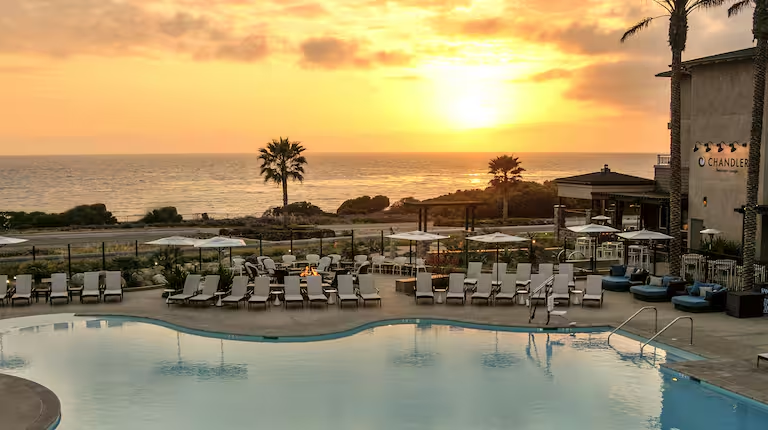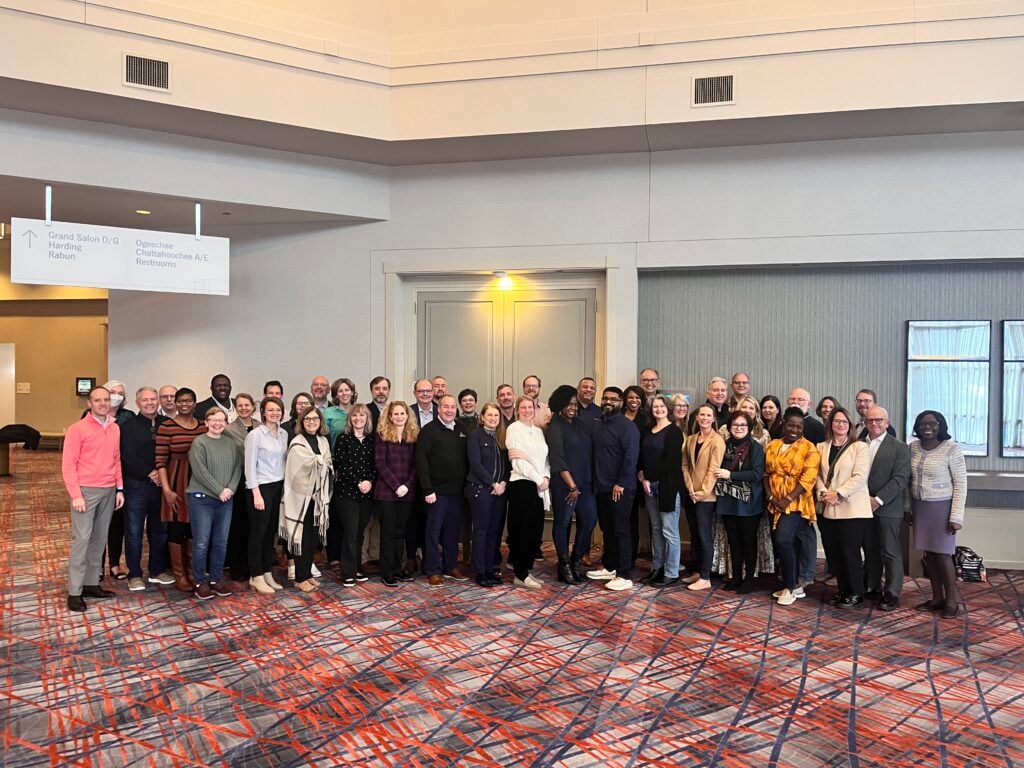The Presidential Vocation and Institutional Mission program is built on a proven belief: success in a college presidency comes from an alignment between personal calling and an institution’s mission. Misalignment can lead to shortened tenures, but with the right fit, a president can achieve meaningful impact. The purpose of this program is to help participants gain a better understanding of their vocation and how an institution’s mission and their calling align.
Program Benefits:
- Gain clarity on your vocational calling.
- Explore the distinctiveness of various institutional missions.
- Engage with a supportive community of peers and experienced facilitators.
- Strengthen your candidacy for a presidency by aligning personal and institutional missions.
- Explore alignment between your calling and your spouse’s/partner’s calling.
Program Structure:
This yearlong program combines seminars, small group discussions, individual consultations, and extensive reading, all guided by experienced presidents and their spouses/partners.
- Two Seminars: A four-day summer seminar and a two-day winter seminar, with pre-assigned readings.
- Ongoing Support: At least three video consultations with facilitators throughout the year.
- Mentorship: A team of facilitators—experienced presidents and their spouses/partners—guide participants in this inquiry over the course of one year.
- An online community: Continuous online forum for cohorts to connect with peers to share updates, discussion topics, and conversations about current experiences through their vocational journey.

Event Dates:
Summer Seminar: July 12–15, 2026 | Location: Cape Rey, California
Winter Seminar: Dates TBD | Location: Atlanta, Georgia
Costs: Thanks to Lilly Endowment Inc., most program expenses are covered. The registration costs are $468 for participants and $286 for participating spouses/partners.
Why This Program?
How one does the work of a college president is an essential question. Why one takes up the presidency as a calling in life is even more important and should be asked and answered first.
This is the premise of the yearlong, seminar-based Presidential Vocation and Institutional Mission program offered by the Council of Independent Colleges. In this program, a small cohort of college and university senior administrators and their spouses or partners join to read and think deeply about meaning and purpose in life as those values are applied to the presidency. At the same time, participants read and think about what makes the mission of one college or university different from that of another.
“The program’s focus on aligning personal vocation with institutional purpose has enabled me to lead with greater clarity, authenticity, and effectiveness. Most significantly, this vocational clarity has shaped my approach to balancing Stillman’s identity as the community’s college with our comprehensive cradle-to-career initiatives. This balance reflects my identification as a servant leader, committed to serving both our students and the broader community we call home.”
—Yolanda Page, President, Stillman College (AL) and former Vice President for Academic Affairs, Dillard University (LA)

Understanding the “Why” Behind Presidential Leadership
This program helps potential leaders discover whether a presidency is their true calling and, if so, where they can best serve. Remarkably, 35 percent of past participants have become college presidents, while others have advanced their careers in significant other ways. This experience is designed to set the stage for a fulfilling and successful presidency, benefiting you, your family, and your institution.
The yearlong seminar helps senior leaders explore the deeper purpose behind becoming a college president. This transformative program invites participants—alongside their spouses or partners—to engage in deep reflection on their vocational calling while strategically aligning personal aspirations with institutional mission, creating a foundation for thoughtful career advancement. Drawing from a rich tapestry of diverse perspectives, participants explore leadership development through the wisdom of distinguished voices representing different groups and populations within the US and abroad. Readings and the content of the program have been updated and contemporized to reflect current issues and to include voices that have not always been included in the discussion of presidential vocation and institutional mission. i. Through seminar discussions and mentorship, the program continues to help participants search inward, and answer why now might be the right time for them to serve, as well as how to determine where they should serve, and how their unique values can lead to a successful and fulfilling presidency.
Who Should Apply?
This program is designed for senior leaders at CIC member institutions—typically vice presidents, provosts, or deans reporting to the president. Ideal candidates have at least three years in their current role and are considering a future presidency, whether certain or still exploring.
This program values diversity and invites leaders from all areas of college administration. Spouses and partners are encouraged to participate, as their involvement is crucial in this journey. Each cohort includes around 20 prospective presidents, most accompanied by their spouse or partner.
“The Presidential Vocation and Institutional Mission program stands apart from any other professional development experience I’ve encountered. Through the use of carefully curated literary works, it prompted deep reflection on why I aspired to the presidency and offered an unvarnished view of what the role truly entails. Notably, the program addressed dimensions often overlooked in presidential preparation—such as the complex dynamics involving a spouse, or the unique challenges faced by presidents without one. It also underscored the importance of building a personal support network before stepping into the role. By centering on the context of independent colleges, the program acknowledged both the distinctive rewards and the structural headwinds these institutions face—particularly given they are not always top of mind in the broader higher education ecosystem. Most important, it fostered a trusted peer network. Now in my second year as president, I continue to draw strength from those connections.”
—Teresa Dahlberg, President, University of Tampa (FL) and former Provost and Vice Chancellor for Academic Affairs, Texas Christian University (TX)
Nominations for the 2026-2027 Program Details
Nominations received by February 6, 2026, will be given priority consideration. Selected participants will be notified in March.
The following criteria will be used to select participants:
- Evidence that the nominee has had significant relevant experience and has demonstrated the potential to serve with success as a college president in the next step of their career;
- Evidence that the nominee has begun to reflect on their own sense of vocation, has contemplated the relevance of institutional mission for the presidency, and is prepared to engage in frank and open discussion of these matters with other program participants;
- Evidence that the nominee takes a broad view of the issues involved in fulfilling the expectations of a college or university presidency; and
- The nominee’s likely contribution to the diversity of perspectives and experiences in the program and to independent higher education leadership.
How to Be Considered
Senior administrators of CIC member institutions, typically at the level of vice president or provost with three years or more experience in their present role, are eligible to be nominated for the Presidential Vocation and Institutional Mission program. Consideration for participation in the program is available by a nomination from your current president only.
To be considered for this program, interested senior cabinet members will need to nominated by their current institution’s president. Applicant’s should submit the following materials online for consideration in the selection of the 2025–2026 Presidential Vocation and Institutional Mission program. Please coordinate with your current institution’s president for their letter of nomination. The complete packet for nominations consists of the following items:
- A LETTER OF NOMINATION from the president of the nominee’s current institution that addresses the nominee’s potential readiness for the presidency and how the nominee will benefit from participation in this program with its distinctive attention to presidential vocation and institutional mission. The letter should come from the president and indicate their willingness to support the nominee’s participation in the yearlong program;
- A REFLECTIVE STATEMENT of no more than two pages prepared by the nominee that discusses (a) the nominee’s own sense of personal vocation; (b) the role of mission in higher education; (c) anticipated benefits—considered in the spirit of this program—for the nominee and spouse or partner as well as institutions they might serve; and (d) if relevant, the diversity of thought, experience, or person they would bring to the program cohort. Reviewers will carefully consider how well the nominee’s statement addresses the selection criteria;
- A COVER FORM (the first two steps of the online portal) that includes contact information for the nominee and nominator as well as professional and personal information about the nominee, including whether a spouse or partner intends to participate in the program; and
- The nominee’s CURRICULUM VITAE.
Note: A single file in PDF format is strongly preferred.
Program Facilitators
Director
- Steven C. Bahls, president emeritus, Augustana College
Facilitators
- Jane E. Bahls, Retired Presidential Spouse, Augustana College (IL)
- Alan Cottrell, Presidential Spouse, Texas Lutheran University
- Debbie Cottrell, President, Texas Lutheran University
- Barbara Farley, President, Illinois College
- Mary Dana Hinton, President, Hollins University (VA)
- Robert Williams, Presidential Spouse, Hollins University (VA)
- Titi Ufomata, senior vice president for academic programs, Council of Independent Colleges (DC)
Contact Information
For more information, contact Titilayo Ufomata, CIC Senior Vice President for Academic Programs, at (202) 545-6041 or tufomata@cic.edu, or Emilee O’Dell, CIC Program Manager for Presidential Engagement, at (202) 773-0560 or eodell@cic.edu.

CIC is grateful to Lilly Endowment Inc. for its ongoing support of the Presidential Vocation and Institutional Mission program.



